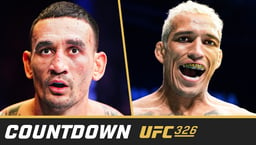
Issue 080
October 2011
As MMA’s popularity surges it is exposing a mass of mixed martial artists who struggle to take control over the one thing that actually governs their destiny in the Octagon: their own mind. Origins of mixed martial arts was born into the Greek Olympic Games 648BC as Pankration. Ancestors of our great sport were most likely told way back then what modern-day gladiators are today, that fighting is ‘90% mental 10% physical.’ In reality, the science of psychology cannot offer a definitive answer on the exact amount the mind and body play in the intricacies of combat, as there are no real means of measuring them. But every man and woman who has ever had the courage to test themselves in hand-to-hand combat understand that once a fight commences fate naturally tips the scales in favor of the mental game. Why? Because all the grueling hours, days, months, years sacrificed in the gym fine tuning their craft, relies on the mind to ignite a performance that is worthy of their true ability when it counts the most: in our sport, inside the Octagon.
Studies conducted on Olympians and other supercharged humans reveal over and over again that mental toughness and psychological states become more critical the higher an athlete moves up through the pecking order. At the heart of MMA, fighters who climb the ranks and are within reach of the summit of their relative competition – amateur, semi-pro, pro or champion – will come up against the best of the best from that specific division. This is where the difference in caliber of opponents becomes less and less, as they are matched on comparative skill, bulk and experience. Therefore, being able to master the six inches between your ears in order to control the six feet below, becomes more vital as fighters mature as combatants.
The vast majority of competitive mixed martial artists accept this fact, acknowledging the mental game as being the critical heartbeat to success, yet the overwhelming majority will dedicate almost 99% of their energy into honing their physical game and only the smallest fraction in developing their mental toughness. It seems the lion’s share of fighters follow the ancient creed, ‘mental toughness comes from training and competing as hard as humanly possible.’ This spit-blood philosophy works to a point, but will only carry a fighter so far. For those who engage in the art of bone to flesh are ever to tap into their hidden potential and unleash it, they’ll have to get up close and personal with the most unforgiving, dominant and ruthless opponent they’ll ever face: themselves.
UNEARTHING SPORTS PSYCHOLOGY
Sport psychology simply goes toe-to-toe with combat-specific mental barriers. Fight performance anxieties, the fear of losing, being emasculated, low self-confidence and, ultimately, being embarrassed and dominated by an opponent.
By its very nature MMA can’t help but detonate a swarm of psychological stressors on the psyche of its host, which incidentally are identical to those experienced by soldiers who dodge enemy fire on the frontline. Sport psychology therefore has never been so crucial to those who chose the path of the warrior. Yet with less than 5% of fighters utilizing the mountain of psychological strategies to enhance their performance, it cements the fact that it is not used systematically or as effectively as it could be by the fighting fraternity.
A recent survey conducted on thousands of fighters, trainers and coaches illustrates it further and revealed most didn’t know where to start or how to teach mental training skills. They were stunned to know that with the correct psychological training, factors such as mental toughness, relaxation, confidence and concentration can be learned, harnessed and developed just like stand-up, BJJ, wrestling or any other martial arts discipline.
The wielding power of sport psychology, however, cannot turn an average fighter into a phenomenal one, but it can help them reach the peak of their physical limits by strengthening the mind and severing the chord between negative thinking and competition.
THE AMBUSH
MMA gyms are littered with natural and gifted physical specimens that have all the tools, in theory, to take them to the top, but fall short because they were unable to execute their training when they needed to be in control. When a fighter ‘freezes’ or makes an inexplicable fatal error that causes them to lose or tap out, ‘stress’ in whatever form it decides to take, is usually the culprit. Stress or performance anxiety is responsible for folding hopefuls and seasoned veterans off guard who are not mentally prepared. Not even the uber-unorthodox light heavyweight champion with razor-sharp elbows is spared. Yes, even Jon ‘Bones’ Jones fears its wrath and worries about not performing to the best of his ability or being embarrassed and exposed.
Mixed martial artists accept that stress comes with the territory and yet it is still the number-one reason why most fall by the wayside or fail to reach their potential. The types of stressors that ambush a fighter’s performance depend on how they react to the perceived threats of the environment around them. As humans we use three psychological mechanisms to interpret stressors: thoughts processing (cognition), emotional responses (behavioral) and physical responses (somatic). The essence of this majestic sport and what it stands for places mammoth stressors upon its competitors from: inducing extreme exhaustion, punching above weight realization, contracting stage fright under the lights and cameras, paying heed to abusive hostile fans, unresolved personal issues, to the uncertainty of the outcome and the ultimate fear of losing and frailties being laid bare. These stressors trigger the ‘flight or fight’ response, which is a hard-wired automatic reaction that prepares the body to stand its ground or run for the hills when survival is threatened.
The graph (above) illustrates the relationship between a fighter’s performance ability and the level of stress experienced. The grey line represents a fighter ‘choking’ under pressure with performance ability dropping drastically as stress levels increase. The blue line represents a composed and focused fighter thriving under pressure while maintaining consistent performance ability as stress levels increase.
All fighters can find themselves on the blue line with the aid of sport psychology to boost their mental toughness to manage stress inside or outside of the cage.
To master the mind requires a heightened self-awareness and fighters need to understand their natural responses to the many guises of stress and tune into the body’s signals. Learning to tame the demands of the extreme competition that is mixed martial arts involves learning to read thought patterns and physical responses and to develop the skills necessary to release their optimum skill-set. Successful fighters who achieve this come from all walks of life, but what they share in common is the courage to push back personal boundaries as a means to liberate the body and mind through a high-octane kinaesthetic game of chess. Grace under fire allows a fighter to tackle intense challenges that make life far more rewarding, giving it meaning and purpose.
Fighters Only recognizes the importance of the mental game and is dedicating itself to utilizing and presenting the pantheon of combat sport psychological techniques to its readers. The goal is to guide not only fighters, but also coaches and trainers, in assessing mental skill profiles, to understand the strengths and weaknesses of a fighters mental game and weave them into training the same way it is done when filling in holes in their fight game.
FIGHT PSYCHOLOGY FACTS
TRUE
Sport psychology exposes a fighter’s limitations and conquers them through constructive mental toughness training.
Sport-psychological training aids fighters in applying mental game strategies to allow them to perform to their full potential.
Mental-game coaching helps fighters develop a mental toughness, freeing psychological obstacles that hold them back when under extreme stress.
Fighters become more aware of themselves, increasing confidence and tactical intelligence, leading to competition-crushing performances.
MYTH
Mental performance training or sports psychology is only beneficial to fighters bouncing back from a loss or are in a bad place emotionally.
Working with a sports psychologist is a sign of mental weakness and is a last resort when everything else fails.
Something must be wrong mentally with a fighter if he or she has to work with a mental performance coach or sports psychologist.










